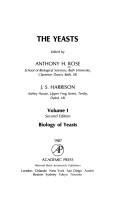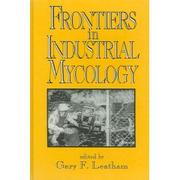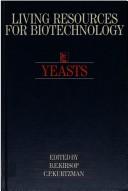| Listing 1 - 10 of 32 | << page >> |
Sort by
|

ISBN: 0125964110 0125964137 0125964129 9780125964128 9780125964135 9780125964111 Year: 1987 Volume: 1 Publisher: London Academic press
Abstract | Keywords | Export | Availability | Bookmark
 Loading...
Loading...Choose an application
- Reference Manager
- EndNote
- RefWorks (Direct export to RefWorks)
Yeast fungi. --- 582.282 --- Basidiomycetes --- Blastomycetes --- Endomycetales --- -Saccharomycetineae. Yeasts. Brettanomyces --- -Yeasts --- 582.282 Ascomycetes --- -582.282.23 Saccharomycetineae. Yeasts. Brettanomyces --- -Yeast fungi --- -Metabolism --- Yeast fungi --- Yeasts --- Fungi --- Ascomycetes --- 582.282.23 --- 582.282.23 Saccharomycetineae. Yeasts. Brettanomyces --- Saccharomycetineae. Yeasts. Brettanomyces --- Ecology --- Metabolism. --- Physiology. --- Metabolism --- Physiology --- Microbiology. --- Yeast fungi - Ecology --- Yeast fungi - Metabolism. --- Yeast fungi - Physiology.
Periodical
Abstract | Keywords | Export | Availability | Bookmark
 Loading...
Loading...Choose an application
- Reference Manager
- EndNote
- RefWorks (Direct export to RefWorks)
Focuses on research on all aspects of Saccharomyces and other yeast genera. The topics covered include: genetics; genomics; molecular biology; cell and developmental biology; biochemistry; physiology; pathobiology; biotechnology; ecology; taxonomy; and evolution. Abstracts and full-text (PDF only), 1997- ; abstracts only, 1996.
gisten --- Genetics --- yeast [fungi] --- Yeasts --- Yeast --- Levure --- genetics --- Periodicals. --- Périodiques --- Yeasts. --- 582.282.23 --- 579 --- 57 --- Fungal Proteins --- Saccharomycetineae. Yeasts. Brettanomyces --- Microbiology --- Biological sciences in general --- Periodicals --- YEASTS --- Agriculture Sciences --- Agricultural Biotechnology --- periodicals --- Soil Chemistry, Microbiology, Fertility & Fertilizers --- Agriculture Sciences. --- Agricultural Biotechnology. --- periodicals. --- 579 Microbiology --- 582.282.23 Saccharomycetineae. Yeasts. Brettanomyces --- Yeast. --- genetics. --- Nematospora --- Edible fungi --- Leavening agents --- Yeast-free diet --- Levures (Botanique)

ISBN: 0412034611 1468471147 1468471120 Year: 1992 Publisher: New York ; London Chapman & Hall
Abstract | Keywords | Export | Availability | Bookmark
 Loading...
Loading...Choose an application
- Reference Manager
- EndNote
- RefWorks (Direct export to RefWorks)
Fungi --- -Fungi --- -663.12 --- 635.8 --- Fungal kingdom --- Fungus kingdom --- Funguses --- Mycobiota --- Mycota --- Cryptogams --- Mycology --- Biotechnology --- Industrial applications --- Yeasts in general. Brewing yeast. Ascending and descending yeasts --- Edible fungi --- FUN Fungi & Lichenes --- economic botany --- 635.8 Edible fungi --- 663.12 Yeasts in general. Brewing yeast. Ascending and descending yeasts --- 663.12 --- Industrial mycology --- Fungal biotechnology --- FUNGI --- FERMENTED FOODS --- ANTIBIOTICS --- HETEROLOGUS GENE EXPRESSION --- FORESTRY --- WOOD UTILIZATION --- POLLUTION --- BIOLOGICAL CONTROL --- BIOTECHNOLOGY --- UTILIZATION --- CULTIVATION --- ECTOMYCORRHIZAS --- CONTROL
Book
ISBN: 2852068508 Year: 1993 Publisher: Paris Technique et documentation Lavoisier
Abstract | Keywords | Export | Availability | Bookmark
 Loading...
Loading...Choose an application
- Reference Manager
- EndNote
- RefWorks (Direct export to RefWorks)
Microbiologie industrielle --- 579.66 --- Industrial and chemical microbiology --- 579.66 Industrial and chemical microbiology --- Fungi. --- Microorganisms. --- Bacteria --- Yeasts

ISBN: 0521352274 Year: 1988 Publisher: Cambridge ; New Rochelle ; Melbourne, Vic : Cambridge University Press,
Abstract | Keywords | Export | Availability | Bookmark
 Loading...
Loading...Choose an application
- Reference Manager
- EndNote
- RefWorks (Direct export to RefWorks)
Levure --- Yeasts --- Brevet --- Patents --- Taxonomie --- taxonomy --- Identification --- identification --- Biotechnologie --- Biotechnology --- Documentation --- Collection botanique --- Plant collections --- Pool de gènes --- Gene pools --- UNESCO --- Biotechnology. --- Yeasts. --- Yeast fungi --- -Yeasts --- Fungi --- Basidiomycetes --- Blastomycetes --- Endomycetales --- Yeast --- Fungal Proteins --- Biotechnologies --- -Biotechnology --- Yeast biotechnology --- Microbial biotechnology --- Yeast industry --- Basic Sciences. Biotechnology -- Biotechnology (General) --- ALLW. --- CULTURES --- PATENTS --- IDENTIFICATION METHODS --- PRESERVING --- SAFETY --- ADMINISTRATION --- INFORMATION SERVICES --- RESOURCE CENTRES --- BIOTECHNOLOGY --- YEASTS --- COLLECTIONS --- PROTECTION --- METHODS --- Basic Sciences. Biotechnology -- Biotechnology (General). --- Administration
Book
ISBN: 012648080X Year: 1980 Publisher: London Academic press
Abstract | Keywords | Export | Availability | Bookmark
 Loading...
Loading...Choose an application
- Reference Manager
- EndNote
- RefWorks (Direct export to RefWorks)
Pathogenic fungi --- Yeast fungi --- Yeast --- Congresses. --- Fungi, Pathogenic --- Yeasts --- Congresses --- Fungi --- Pathogenic microorganisms --- Medical mycology --- Basidiomycetes --- Blastomycetes --- Endomycetales
Book
ISBN: 0125964021 012596403X 9780125964029 Year: 1970 Publisher: London Academic press
Abstract | Keywords | Export | Availability | Bookmark
 Loading...
Loading...Choose an application
- Reference Manager
- EndNote
- RefWorks (Direct export to RefWorks)
582.282.23 --- 582.282.23 Saccharomycetineae. Yeasts. Brettanomyces --- Saccharomycetineae. Yeasts. Brettanomyces --- Yeast fungi. --- Plant and Crop Sciences. Biology of Bacteria, Fungi and Plants -- Fungi --- ALLW. --- YEASTS --- MICROORGANISMS --- METABOLISM (MICROBIAL) --- CELL MEMBRANE --- LIPIDS --- NUCLEIC ACIDS --- CARBOHYDRATES --- PIGMENTS, MICROBIAL --- CELL WALL (MICROBIAL) --- GROWTH
Book
ISBN: 1617797693 9781617797699 1617797707 Year: 2012 Publisher: Totowa, NJ : Humana Press : Imprint: Humana,
Abstract | Keywords | Export | Availability | Bookmark
 Loading...
Loading...Choose an application
- Reference Manager
- EndNote
- RefWorks (Direct export to RefWorks)
In the last few years, significant advances have been made in understanding how a yeast cell responds to the stress of producing a recombinant protein, and how this information can be used to engineer improved host strains. The molecular biology of the expression vector, through the choice of promoter, tag and codon optimization of the target gene, is also a key determinant of a high-yielding protein production experiment. Recombinant Protein Production in Yeast: Methods and Protocols examines the process of preparation of expression vectors, transformation to generate high-yielding clones, optimization of experimental conditions to maximize yields, scale-up to bioreactor formats and disruption of yeast cells to enable the isolation of the recombinant protein prior to purification. Written in the highly successful Methods in Molecular Biology™ series format, chapters include introductions to their respective topics, lists of the necessary materials and reagents, step-by-step, readily reproducible laboratory protocols, and key tips on troubleshooting and avoiding known pitfalls. Authoritative and practical, Recombinant Protein Production in Yeast: Methods and Protocols, seeks to aid scientists in adopting yeast as a protein production host.
Pichia --- Recombinant Proteins --- Recombinant proteins --- Saccharomyces cerevisiae --- Yeast fungi --- Yeasts --- biosynthesis --- Biotechnology --- Fungi --- Proteins --- Publication Formats --- Saccharomyces --- Saccharomycetales --- Publication Characteristics --- Ascomycota --- Eukaryota --- Amino Acids, Peptides, and Proteins --- Chemicals and Drugs --- Organisms --- Laboratory Manuals --- Health & Biological Sciences --- Biomedical Engineering --- Baker Yeast --- S cerevisiae --- Baker's Yeast --- Brewer's Yeast --- Yeast, Baker's --- Yeast, Brewer's --- Baker Yeasts --- Baker's Yeasts --- Bakers Yeast --- Brewer Yeast --- Brewer's Yeasts --- Brewers Yeast --- Yeast, Baker --- Yeast, Bakers --- Yeast, Brewer --- Yeast, Brewers --- Yeasts, Baker --- Yeasts, Baker's --- Yeasts, Brewer's --- Proteins, Biosynthetic --- Proteins, Recombinant DNA --- Biosynthetic Proteins --- DNA Recombinant Proteins --- DNA Proteins, Recombinant --- Proteins, DNA Recombinant --- Proteins, Recombinant --- Recombinant DNA Proteins --- Recombinant Proteins, DNA --- Hansenula --- Hansenulas --- Pichias --- Yeast --- Genetically engineered proteins --- Eucarya --- Eukarya --- Eukaryotes --- Eukaryotas --- Eukaryote --- Ascomycetes --- Cochliobolus --- Sclerotinia --- Ascomycete --- Ascomycotas --- Sclerotinias --- Budding Yeast --- Endomycetales --- Endomycopsis --- Yeast, Budding --- Budding Yeasts --- Endomycetale --- Endomycopses --- Saccharomycetale --- Yeasts, Budding --- Gene Products, Protein --- Gene Proteins --- Protein Gene Products --- Proteins, Gene --- Fungi, Filamentous --- Molds --- Filamentous Fungi --- Filamentous Fungus --- Fungus --- Fungus, Filamentous --- Mold --- Genetic engineering --- Saccharomyce --- Medicine. --- Human genetics. --- Biomedicine. --- Human Genetics. --- Genetics --- Heredity, Human --- Human biology --- Physical anthropology --- Clinical sciences --- Medical profession --- Life sciences --- Medical sciences --- Pathology --- Physicians
Periodical
ISSN: 15671356 15671364 Year: 2001 Publisher: [Amsterdam] ; [New York] : Oxford: Elsevier Science, Oxford Academic
Abstract | Keywords | Export | Availability | Bookmark
 Loading...
Loading...Choose an application
- Reference Manager
- EndNote
- RefWorks (Direct export to RefWorks)
yeast [fungi] --- General microbiology --- biotechnologie --- Biotechnology --- gisten --- bioengineering --- Yeast --- Levure --- Periodicals --- Périodiques --- Yeasts. --- Yeast. --- #TS:WBIB --- 57 --- 579 --- Biological sciences in general --- Microbiology --- Agriculture Sciences --- Chemistry --- Soil Chemistry, Microbiology, Fertility & Fertilizers --- Biochemistry --- 579 Microbiology --- Yeasts --- Fungal Proteins --- Nematospora --- Edible fungi --- Leavening agents --- Yeast-free diet

ISBN: 9780896033191 0896033198 9781592595402 9786610836628 1280836628 1592595405 Year: 1996 Volume: 53 Publisher: Totowa, NJ : Humana Press : Imprint: Humana,
Abstract | Keywords | Export | Availability | Bookmark
 Loading...
Loading...Choose an application
- Reference Manager
- EndNote
- RefWorks (Direct export to RefWorks)
Yeast Protocols intends to offer a selection of well-proven proto cols in cell and molecular biology, applicable to yeasts including, but certainly not exclusively aimed at, Saccharomyces cerevisiae. Saccharomyces cerevisiae and its very distant cousin, Schizosacc- romyces pombe, are of course now foremost model eukaryotic organisms, and the focus of wide-ranging experimental studies, especially those using molecular genetic techniques. Many of the lat ter, such as DNA sequencing and in vitro mutagenesis, are general DNA techniques, well covered in other volumes of Humana's Meth ods in Molecular Biology series, and elsewhere. The inclusion of a number of non-DNA techniques in this book is meant to reflect the resurgent interest in yeast cell biology sparked by the development of gene manipulation methods—for example, cellular localization of cloned gene products using microscopical techniques. The presentation of protocols follows the successful Methods in Molecular Biology series format, with a clear sequence of steps and extensive troubleshooting notes. It is our hope that these protocols will be useful not only to established members of the full-time research community, but also to the less experienced—first degree level and masters students undertaking project work, as well as PhD students starting their experimental programs; I am well aware that these young apprentice scientists are not always able to receive the supervision time that they, and indeed their supervisors, would like.
Yeasts --- Yeast fungi --- Levures (Botanique) --- physiology --- isolation & purification --- cytology --- Biotechnology --- Research --- Methodology --- Biotechnologie --- Yeast --- -Yeast fungi --- -Yeasts --- Fungi --- Basidiomycetes --- Blastomycetes --- Endomycetales --- Nematospora --- Edible fungi --- Leavening agents --- Yeast-free diet --- -Methodology --- Biotechnology. --- Methodology. --- physiology. --- cytology. --- isolation & purification. --- -Biotechnology --- Cytology. --- Isolation & purification. --- Physiology. --- Yeast biotechnology --- Microbial biotechnology --- Yeast industry --- Research&delete& --- Cell Biology. --- Cell biology --- Cellular biology --- Biology --- Cells --- Yeast fungi - Research - Methodology --- Yeast - Biotechnology
| Listing 1 - 10 of 32 | << page >> |
Sort by
|

 Search
Search Feedback
Feedback About
About Help
Help News
News